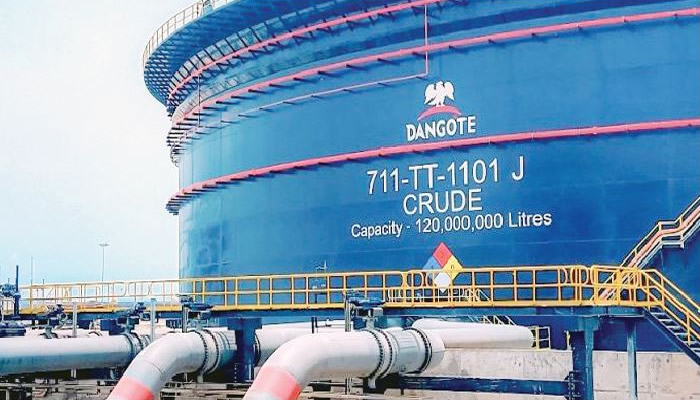A fierce price battle has erupted in Nigeria’s downstream oil sector following the resumption of bulk fuel sales by the Dangote Petroleum Refinery at ₦877 per litre, a move that has placed intense pressure on independent depot owners struggling to stay competitive.The refinery’s decision to restart large-scale supply of Premium Motor Spirit (PMS) at a significantly reduced rate compared to current market prices has upended the fuel supply chain, sparking widespread reactions among marketers, investors, and industry regulators.
According to multiple sources familiar with the development, Dangote Refinery — Africa’s largest single-train oil refinery — resumed fuel distribution this week after a brief maintenance and recalibration period, adjusting its ex-depot pricing structure to reflect current crude oil dynamics and domestic market realities.

This new price, industry observers said, is far lower than the ₦940 to ₦960 per litre range at which many depot owners have been selling to independent marketers in recent weeks, prompting fears of potential losses and market consolidation.
“The refinery’s latest pricing has disrupted the market,” a top marketer in Lagos said. “Many depot operators are now under severe pressure because they cannot match Dangote’s price advantage, especially given their high landing costs and storage expenses.”
The Dangote Refinery’s move is expected to trigger a price correction across the downstream chain, as independent marketers and retailers adjust their pump prices to reflect the new realities. Analysts believe that the development could ease the persistent upward pressure on fuel prices nationwide, though it may also lead to liquidity challenges for smaller players.
A senior executive at the refinery, who spoke on condition of anonymity, explained that the new pricing model was designed to support government efforts to stabilise fuel costs and promote domestic supply self-sufficiency.
“We are committed to ensuring affordable and reliable fuel supply to Nigerians,” the official said. “Our refinery has the capacity to produce and distribute enough petroleum products to meet national demand while maintaining operational efficiency and competitive pricing.”
With a refining capacity of 650,000 barrels per day, the Dangote facility is strategically positioned to reshape Nigeria’s downstream market, which has long been dominated by imported products and fluctuating exchange rates.
Industry experts say the new pricing will redefine competition within the sector. While it may bring relief to consumers in the short term, depot owners — who rely on bulk purchases and resale margins — could face significant revenue losses.
“Dangote Refinery’s pricing strategy represents a major shift in market dynamics,” said energy economist, Dr. Adeola Akintunde. “The refinery is leveraging its economies of scale and integrated operations to set prices that smaller depots simply cannot match. This will likely force consolidation and encourage partnerships among marketers.”
Dr. Akintunde also noted that the refinery’s resumption of bulk sales aligns with its long-term vision of positioning Nigeria as a net exporter of refined petroleum products. “This development is not just about prices — it’s about establishing a new framework for energy independence and industrial competitiveness,” he said.
Meanwhile, the Independent Petroleum Marketers Association of Nigeria (IPMAN) has urged depot owners and marketers to engage with the refinery for direct supply agreements to avoid middlemen and reduce costs.
IPMAN’s National President, Abubakar Maigandi, welcomed the refinery’s decision to resume supply but cautioned that sudden price drops could destabilise existing distribution contracts and credit arrangements.
“We appreciate the refinery’s efforts to make fuel more affordable, but we must ensure that the transition is managed carefully to protect small players in the supply chain,” Maigandi stated.
In response, the Major Energy Marketers Association of Nigeria (MEMAN) said the refinery’s re-entry into the market marks a positive step toward eliminating fuel import dependency and stabilising prices. However, it called for improved coordination between regulators, marketers, and the refinery to ensure transparency and fair competition.
As the new pricing takes effect, industry regulators, including the Nigerian Midstream and Downstream Petroleum Regulatory Authority (NMDPRA), are closely monitoring developments to prevent hoarding, price manipulation, or market distortion.
A statement from the NMDPRA assured Nigerians that it would work with all stakeholders to ensure adequate supply and equitable distribution of petroleum products nationwide.
“The NMDPRA is committed to ensuring that recent changes in the pricing structure benefit consumers and sustain market balance,” the agency said.
Consumers across major cities such as Lagos, Abuja, and Port Harcourt have already begun expressing optimism that the refinery’s move will lead to lower pump prices in the coming days, as competition intensifies among fuel suppliers.
Industry analysts predict that, while depot owners may struggle initially, the long-term benefits of a stable, locally driven fuel market will outweigh short-term disruptions.
“The refinery’s pricing signals a new era in Nigeria’s energy landscape,” said energy analyst, Ibrahim Yusuf. “We’re witnessing the birth of a truly competitive domestic market — one that could finally break the cycle of dependence on fuel imports.”
With Dangote Refinery’s latest intervention, stakeholders believe the coming weeks will be critical in determining how well the downstream sector adjusts to a new equilibrium shaped by local refining power, competitive pricing, and consumer expectations.
Support InfoStride News' Credible Journalism: Only credible journalism can guarantee a fair, accountable and transparent society, including democracy and government. It involves a lot of efforts and money. We need your support. Click here to Donate
